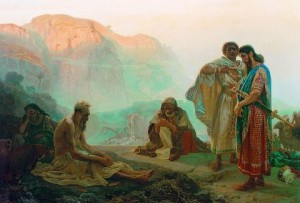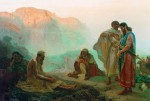I am finally returning to my series on the violence of God in Scripture. We left off in the middle of a discussion about the violence of the flood. This post is going to look at the account of the flood in Job 22:15-18. If you need a refresher on some of what we have looked at previously regarding the flood and the violence of God in Scripture, feel free to brows through some of the articles listed at the bottom of this post.
 There are biblical passages outside of Genesis 6–8 that refer to the flood. One of the earliest of these is Job 22:15-18. In fact, since many scholars believe that the events described in the book of Job occurred long before the author of Genesis was alive [1], what the book of Job records about the flood may well be the earliest description of what happened in that cataclysmic event. [2]
There are biblical passages outside of Genesis 6–8 that refer to the flood. One of the earliest of these is Job 22:15-18. In fact, since many scholars believe that the events described in the book of Job occurred long before the author of Genesis was alive [1], what the book of Job records about the flood may well be the earliest description of what happened in that cataclysmic event. [2]
Nevertheless, some may take exception with Job 22:15-18 as saying much of anything reliable about the flood. Why? Because Job is not the speaker in Job 22:15-18. Instead, Eliphaz, one of Job’s friends, is speaking.
However, even though Eliphaz is the one speaking, this does not mean we should automatically discredit everything he says. We will consider the book of Job in more detail later in posts and see that Job is in basic agreement with most of what his friend Eliphaz says. So although Eliphaz was wrong about the reasons for Job’s suffering, this does not mean he was wrong about everything he said. Most of what Eliphaz and Job’s other friends said is true in other circumstances; their fault was that what they were saying was not true in Job’s situation.
Job 22:15-18 and the Flood
So notice what it is that Eliphaz says about the flood in Job 22:15-18:
Will you keep to the old path that the wicked have trod?
They were carried off before their time, their foundations washed away by a flood.
They said to God, “Leave us alone! What can the Almighty do to us?”
Yet it was he who filled their houses with good things… (Job 22:15-18a, NIV) [3]
According to Eliphaz, God’s role in the flood was to give good things to the people who lived prior to the flood (Job 22:18a), but in response, all they wanted was for God to leave them alone. They told God to depart from them!

How they told God to leave them alone is not made clear in Job 22. Maybe it was simply through their persistence in committing great evil. Maybe they said this in response to the preaching of Noah (2 Pet 2:5). Regardless of how it happened, the explanation of Eliphaz for why the flood came upon the earth is that sinful humanity pushed God away.
Eliphaz is stating the sixth principle of the Chaos Theory: that God departs from us when we depart from His protective hand. God never actually departs from us, but He has given to mankind such a high degree of autonomy and freedom, that if we choose to continue down a path of death and destruction, He will let us go, even though it pains Him greatly, and even though He does everything possible to warn us about where such paths lead.
What we see in this earliest explanation of the flood account, is that God did nothing but woo people to Himself by filling their houses with good things (Job 22:18a).
But the people thought they knew better than God, and wanted to live their own way, despite the fact that He poured out His love and care upon them, and even sent righteous Noah to warn them about the flood that was coming. Yet they did not listen, and told God to just leave them alone.
So when the destruction of the flood waters came upon the earth, God had no choice but to do what they had requested, and leave the people alone. When “alienation becomes incurable, God does, in fact, depart.” [4]
[1] Evidence for an early date of the events of Job is seen in several ways. First, Job raised two complete families and died 140 years after his testing (Job 42:16). The LXX says that he died at age 248. This puts him in the age range of Peleg (Gen 10:25), who some think might have been Job’s uncle (if Job is the Jobab of Gen 10:29). Second, Job’s wealth is listed as measured in livestock and possessions, not money, which is further evidence for an extremely early date of the events in Job. Finally, the events recorded in Job were probably events he was familiar with. This includes the post-Flood ice age (38:29-30), cave men (24:4-10; 30:1-8), and the violent aftermath of the Flood which includes earthquakes, volcanoes, windstorms, and the raiding parties which decimated his first family.
[2] Though the events of the book of Job may have occurred before Moses lived, they were probably not written down in their present form until after Moses lived, and obviously, some of the events described in Genesis occurred long before Job lived. Confused yet? The order of events is something along these lines: (1) Creation. (2) The Flood. (3) Job Lived. (4) The story of Job was passed down orally. (5) Moses lived. (6) Moses composed the Pentateuch (No, I do not hold to the JEDP documentary hypothesis), which includes Genesis 6–8. (7) The story of Job was recorded in written form, probably during the reign of King Solomon.
[3] Not surprisingly, there are a few translation problems with Job 22:17-18. The two main issues are where the quotation ends and whether the last words of Job 22:17 should read “to us” or “to them.” See the various translations for how different scholars handle this text. In my opinion, the two issues are connected. If one goes with the textual variant which ends Job 22:17 with the words “to us” (as with the NIV above) then the quote of the people who lived at the time of the flood concludes at the end of Job 22:17. But if one goes with the textual variant which ends Job 22: 17 with the words “to them,” then the quote mark should end half way through Job 22:17 where the people before the flood tell God to “Depart from us” or “Leave us alone.” The last half of Job 22:17 would then be Eliphaz’s aside about what they said. If they tell God to leave them alone, what can the Almighty do? Regardless of how one translates the text, these issues do not affect in any way the main point I am arguing here, that the people at the time of the flood told God to depart from them, to leave them alone. All translations agree on this point.
[4] Campbell, Light through the Darkness, 99.
 How can a God who says "Love your enemies" (Matthew 5:44) be the same God who instructs His people in the Old Testament to kill their enemies?
How can a God who says "Love your enemies" (Matthew 5:44) be the same God who instructs His people in the Old Testament to kill their enemies?
These are the sorts of questions we discuss and (try to) answer in my online discipleship group. Members of the group can also take ALL of my online courses (Valued at over $1000) at no charge. Learn more here: Join the RedeemingGod.com Discipleship Group I can't wait to hear what you have to say, and how we can help you better understand God and learn to live like Him in this world!




As it was in the days of Noah, so it shall be again. Yet this time there will be no ark. Will any escape?
Yes. I am reading your stories. I think you might have an idea?
Yes
Yes, Isaiah 26:20. The Arc is just a pattern. Christ is our hiding place Psalm 32:7. And finally, Pray that you are accounted worthy to escape the coming judgment Luke 21:36
Job had to be written before the great flood because it says that Job lived to be about 140 years of age. After the flood God proclaimed that no man shall live beyond 120 years of age. If God’s Word is true then Job was before the flood!!!
Well, Job has lived 140 years After his devastation and probably was not youngest anyway. His friends included at least two people that was grey haired and of old age, much older than Jobs father. Given the fact, that he had already ten children and aparently only one wife, and the fact that he repeated that feat again afterwards show, that he was not young, but in today standard he was probably quite old. Seems like he lived altogether about 200 years ish. Before flood people lived much longer and there is verse in Job that refers to a flood as the article says. After flood they still lived about 400 years until confusion. In the days of Peleg, son of Eber there is sudden fall to 2oo years livespan. But would be interesting to look if there is reference to confusion of language somewhere in Job
You have to be careful about that type of deduction.
For example Abraham lived 175 years (Genesis 25:7) Isaac lived 180 years (Genesis 35:28), Jacob lived 147 years (Genesis 47:28), Joseph 110 years (Genesis 50:26), Moses lived 120 years (Deuteronomy 34:7).
That’s over the 120 year threshold. Here’s an article that discusses it further: https://versebyverseministry.org/bible-answers/are-people-limited-to-120-years-of-life
Gen.6.3 – Then the Lord said, My Spirit shall not forever dwell and strive with man, for he also is flesh; but his days shall yet be 120 years.
This scripture did not mean man will live up to 120 years and die, because Abraham lived up to 175 years before he died.
The meaning of that scripture is from the day this statement came from Gods mouth to the day the flood will destroy all living on earth is 120 years.
No, the scripture means that people will gradually reach a maximum of around 120 years of age according to their ability to withstand the ultraviolet rays which will no longer be filtered out by the water above the firmament, after the flood.
I completely tripped out when you brought up Job 24 and caveman. That rocked my world. But I think you’re right. I’m so glad God brought me to this article. Thank you.